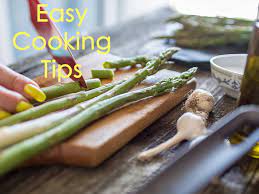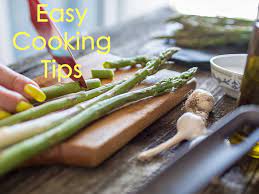Cooking is an essential life skill that everyone should learn, and there’s no better time to start than now. Whether you’re a college student, a busy professional, or a stay-at-home parent, cooking can be an enjoyable and rewarding experience. However, if you’re new to the kitchen, it can be a bit overwhelming. Here are some cooking tips and tricks for beginners to help you get started.
Cooking Hacks for Beginners
- Use a kitchen scale: Measuring ingredients accurately is crucial for successful cooking. Using a kitchen scale will ensure that you get the exact amount of ingredients needed for a recipe.
- Invest in good quality knives: A good set of knives is essential for any home cook. Invest in a set of high-quality knives that will last for years and make preparing ingredients a breeze.
- Prep ingredients ahead of time: Prepping ingredients before you start cooking will save you time and stress in the long run. Chop vegetables, measure out spices, and prepare sauces before you start cooking.
- Keep your kitchen clean and organized: A clean and organized kitchen will make cooking more enjoyable and efficient. Keep your counters clean and free of clutter, and make sure your cooking tools are within reach.
Old-Fashioned Cooking Tips That Really Work
- Cook with cast iron: Cast iron skillets are great for searing, frying, and baking. They also distribute heat evenly, making them perfect for cooking a variety of dishes.
- Use a Dutch oven: A Dutch oven is a versatile piece of cookware that can be used for everything from soups and stews to bread and roasts.
- Salt meat before cooking: Salt draws out the moisture in the meat, which helps to create a crispy exterior and tender interior when cooked.
- Brine poultry: Brining chicken or turkey before cooking will keep the meat moist and tender.
- Soak beans before cooking: Soaking beans overnight will reduce cooking time and make them easier to digest.
- Cook with butter: Butter adds flavor and richness to dishes. Use it to sauté vegetables, sear meats, or make a roux.
- Use fresh herbs: Fresh herbs add flavor and freshness to dishes. Use them to garnish salads, add to sauces, or flavor meats.
More Info
- Make your own broth: Homemade broth is healthier and tastier than store-bought. Save vegetable scraps, bones, and meat trimmings to make your own broth.
- Use a meat thermometer: A meat thermometer will ensure that your meat is cooked to the right temperature, preventing overcooking and ensuring food safety.
- Use a pastry blender: A pastry blender is a handy tool for cutting butter or shortening it into flour, making it easier to make flaky pie crusts and biscuits.
- Use a mandoline slicer: A mandoline slicer makes it easy to create even slices of vegetables, making them perfect for salads, stir-fries, or roasting.
- Use a slow cooker: A slow cooker is a great way to make soups, stews, and roasts with minimal effort. Just set it and forget it.
- Roast vegetables: Roasting vegetables bring out their natural sweetness and create crispy, caramelized edges.
- Make your own vinaigrette: Homemade vinaigrette is healthier and tastier than store-bought. Mix olive oil, vinegar, and spices for a quick and easy salad dressing.
- Use parchment paper: Parchment paper is great for lining baking sheets and preventing food from sticking. It also makes clean-up a breeze.

Home Cooking Tips and Tricks
When you’re cooking at home, there are plenty of tips and tricks you can use to make your meals taste even better. Here are a few home cooking tips and tricks to try:
- Make your own stock: Save vegetable scraps, bones, and leftover herbs to make your own flavorful stock. Simmer the ingredients with water for several hours, then strain and use the resulting liquid in soups, stews, and sauces.
- Use a kitchen scale: Weighing ingredients instead of measuring by volume can result in more accurate and consistent recipes.
- Keep herbs fresh: Wrap fresh herbs in a damp paper towel and store them in a plastic bag in the refrigerator. They’ll stay fresh for several days.
- Invest in quality cookware: Good cookware can last a lifetime and make cooking more enjoyable. Look for pots and pans made from materials like stainless steel or cast iron.
- Use a meat thermometer: Cooking meat to the correct temperature is essential for food safety. Invest in a meat thermometer and use it to ensure your meat is cooked to the proper temperature.
5 Quick Cooking Tips for Beginners
If you’re new to cooking, it can be overwhelming to try and learn all the techniques and methods at once. Here are five quick cooking tips for beginners to help you get started:
- Start with simple recipes: Look for recipes with just a few ingredients and simple instructions. As you become more comfortable, you can gradually try more complicated recipes.
- Prep ingredients in advance: Take the time to chop vegetables, measure out ingredients, and gather all your tools before you start cooking. This will make the process smoother and less stressful.
- Use a timer: Set a timer for each step of the recipe to help you stay on track and avoid burning or overcooking your food.
- Don’t be afraid to taste: Taste your food as you go and adjust seasoning as needed. This will help you develop your palate and learn what flavors you enjoy.
- Practice makes perfect: Remember that cooking is a skill that takes practice. Don’t get discouraged if your first attempts aren’t perfect. Keep trying and you’ll improve over time.
Cooking Tips Everyone Should Know
No matter your level of experience in the kitchen, some cooking tips can be helpful for anyone. Here are a few cooking tips everyone should know:
- Use a sharp knife: A dull knife is more dangerous and can actually make cutting more difficult. Keep your knives sharp and practice good knife skills to make prep work easier.
- Don’t overcrowd the pan: When sautéing or stir-frying, make sure to leave enough space in the pan for the ingredients to cook evenly. Overcrowding can result in steaming instead of browning.
- Use the right pan for the job: Different pans are better suited for different tasks. Use a nonstick pan for delicate foods like eggs, a cast iron skillet for searing meat, and a saucepan for making sauces and soups.
- Salt your pasta water: Adding salt to the water when cooking pasta can help enhance the flavor of the pasta itself.
- Let meat rest before slicing: After cooking meat, let it rest for a few minutes before slicing. This allows the juices to redistribute throughout the meat, resulting in juicier and more flavorful cuts.
FAQs On Cooking Tips and Tricks for Beginners
Q: What are some easy meals for beginners to make?
A: Some easy meals for beginners include pasta dishes, stir-fries, soups, and salads.
Q: How can I make my food taste better?
A: Experiment with different herbs and spices, and don’t be afraid to add salt and pepper to taste.
Q: How can I avoid burning my food?
A: Control the heat of your stove, avoid overcrowding the pan, and set a timer to ensure that you don’t overcook your food.
Q: Can I substitute ingredients in a recipe?
A: Yes, you can substitute ingredients in a recipe if you don’t have the exact ingredients on hand. However, be aware that it may affect the taste and texture of your dish.
Q: How can I meal prep for the week?
A: Prep your ingredients beforehand, cook in large batches, and store your meals in the fridge or freezer.
Conclusion On Cooking Tips and Tricks for Beginners
Cooking can be a fun and rewarding experience, and these cooking tips and tricks for beginners can help you get started. Remember to prep your ingredients, season your food, control the heat of your stove, time your cooking, practice good knife skills, and practice food safety. With practice and patience, you’ll be cooking like a pro in no time.

